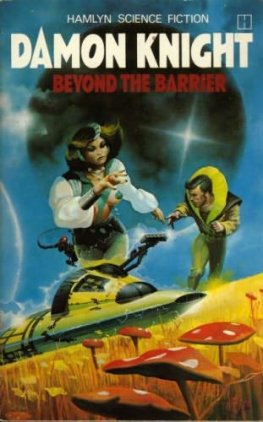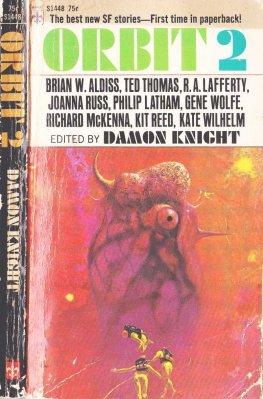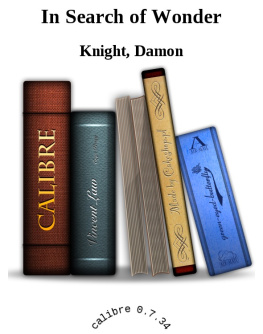Damon Knight - Orbit 15
Here you can read online Damon Knight - Orbit 15 full text of the book (entire story) in english for free. Download pdf and epub, get meaning, cover and reviews about this ebook. year: 1974, publisher: Harper & Row, genre: Science fiction. Description of the work, (preface) as well as reviews are available. Best literature library LitArk.com created for fans of good reading and offers a wide selection of genres:
Romance novel
Science fiction
Adventure
Detective
Science
History
Home and family
Prose
Art
Politics
Computer
Non-fiction
Religion
Business
Children
Humor
Choose a favorite category and find really read worthwhile books. Enjoy immersion in the world of imagination, feel the emotions of the characters or learn something new for yourself, make an fascinating discovery.

- Book:Orbit 15
- Author:
- Publisher:Harper & Row
- Genre:
- Year:1974
- ISBN:0-06-012439-3
- Rating:3 / 5
- Favourites:Add to favourites
- Your mark:
- 60
- 1
- 2
- 3
- 4
- 5
Orbit 15: summary, description and annotation
We offer to read an annotation, description, summary or preface (depends on what the author of the book "Orbit 15" wrote himself). If you haven't found the necessary information about the book — write in the comments, we will try to find it.
Orbit 15 — read online for free the complete book (whole text) full work
Below is the text of the book, divided by pages. System saving the place of the last page read, allows you to conveniently read the book "Orbit 15" online for free, without having to search again every time where you left off. Put a bookmark, and you can go to the page where you finished reading at any time.
Font size:
Interval:
Bookmark:
Orbit 15
Ed by Damon Knight
No copyright 2011 by MadMaxAU eBooks
Copyright 1974 by Damon Knight. All rights reserved. Printed in the United States of America. No part of this book may be used or reproduced in any manner whatsoever without written permission except in the case of brief quotations embodied in critical articles and reviews. For information address Harper & Row, Publishers, Inc., 10 East 53rd Street, New York, N.Y. 10022. Published simultaneously in Canada by Fitzhenry & Whiteside Limited, Toronto.
FIRST EDITION
isbn: 0-06-012439-3
LIBRARY OF CONGRESS CATALOG CARD NUMBER: 74-1890
They Say
One day when Backster happened to cut his finger and dabbed it with iodine, the plant that was being monitored on the polygraph immediately reacted, apparently to the death of some cells in Backsters finger. Though it might have been reacting to his emotional state at the sight of his own blood, or to the stinging of the iodine, Backster soon found a recognizable pattern in the graph whenever a plant was witnessing the death of some living tissue.
Could the plant, Backster wondered, be sensitive on a cellular level all the way down to the death of individual cells in its environment?
On another occasion the typical graph appeared as Backster was preparing to eat a cup of yogurt. This puzzled him until he realized there was a chemical preservative in the jam he was mixing into the yogurt that was terminating some of the live yogurt bacilli. Another inexplicable pattern on the chart was finally explained when it was realized the plants were reacting to hot water being poured down the drain, which was killing bacteria in the sink.
The Secret Life of Plants,
by Peter Tompkins and Christopher
Bird (Harper & Row, 1973)
~ * ~Aha! says our novice. You have to use verbs with thee and thou. So he does. But he doesnt know how. There are very few Americans now alive who know how to use a verb in the second person singular. The general assumption is that you add -est and youre there. I remember Debbie Reynolds telling Eddie Fisher do you remember Debbie Reynolds and Eddie Fisher? Whithersoever thou goest there also I goest. Fake feeling: fake grammar.
Then our novice tries to use the subjunctive. All the wass turn into weres, and leap out at the reader snarling. And the Quakers have got him all fouled up about which really is the nominative form of Thou. Is it Thee, or isnt it? And then theres the She-to-Whom Trap. I shall give it to she to whom my love is given! Him whom this sword smites shall surely die! Give it to she? Him shall die? It sounds like Tonto talking to the Lone Ranger. This is distancing with a vengeance. But we arent through yet, no, we havent had the fancy words. Eldritch. Tenebrous. Smaragds and chalcedony. Mayhap. It cant be maybe, it cant be perhaps; it has to be mayhap, unless its perchance. And then comes the final test, the infallible touchstone of the seventh-rate: Ichor. You know ichor. It oozes out of severed tentacles, and beslimes tesselated pavements, and bespatters bejewelled courtiers, and bores the bejesus out of everybody.
Ursula K. Le Guin, discussing the perils of fantasy, in the essay
From Elfland to Poughkeepsie
(Pendragon Press,
Portland, Oregon, 1973)
~ * ~Elsewhere I have suggested the cul-de-sac resulting from the rise of literary realism and naturalism. In literary study the theories behind them reached a kind of climax in Vernon L. Parringtons Main Currents in American Thought (1927). . . .
Almost at once reaction set in. Drawing upon earlier aesthetic critics, such as James in fiction and the French Symbolists in poetry, many critics insisted that one should give all his attention to the work itself, not to outside or non-literary matters.
(Do you recall that in More Issues at Hand, even as he wondered why sf was no longer a part of the mainstream, as it had been at the time of Wells, James Blish found very little practical use for the historical criticthe man who detects trends and influences, and places individual works in the settings of their timesexcept to the reader and called for the technical critic [whose] work usually takes the form of explication du lexte, or what used to be called The New Criticism, twenty years ago. At least in this passage, Blish has taken sides in this basic controversy.) The extreme advocates of a purely aesthetic criticism insisted that their students (many of them now teachers) examine a book in vacuo.
Apply this to science fiction. It makes no difference whether Stanton Coblentz, Otis Adelbert Kline, Gene Wolfe, or Harry Harrison wrote the story. It makes no difference whether Hugo Gernsback published it in Wonder Stories or Damon Knight accepted it for the Orbit series. It makes no difference whether it was written in the 1890s when the vision of a technological Utopia was bright or in the 1960s when many authors, like John Brunner and Brian Aldiss, had perhaps become somewhat disillusioned by the failure of these earlier dreams.
None of these matters, say the most ardent aesthetic critics, really contribute to our understanding of the story. And one never, never inquires into the intention of the author, for even he himself does not know what he intended.
Thomas D. Clareson
(SFWA Forum, No. 31)
FLAMING DUCKS AND GIANT BREAD
R. A. Lafferty
Yes, in fact, it has been a long time since the year began in April.
1
This is the year of clod and clown.
This is the year when the sky falls down.
A huge bloody glob fell in front of Valery Mok with a smash and a splash. It was no small thing. It was at least a thousand pounds of flesh: raw, red, bloody flesh.
And human, Valery said. One can always tell human flesh. She tasted a bit of the blood on her finger. Type AB, she said. (Yet there were those who never believed that Valery could identify blood groups by taste.) All right, Valery said then, whos the joker?
There was no sound or vapor trail overhead. There was no high building near enough to be the source of the big bloody glob, not if it had fallen normally. And there was no near person who was powerful enough to have hurled such a thing. There were people of a sort there, thats true. These people were calling Happy New Year! to each other, but they werent people capable of heaving thousand-pound hunks of flesh about.
It was early morning of the first day of April. And the year was one that was coincident in several numerations.
Its been many a time since the year began in April, Valery told the town. April, the opening, the beginning. But the beginning was tampered with long ago. How could these people know that this was really New Years? Most of them werent even born in those old centuries.
Do any of you know of any giant who has disappeared or been slaughtered? she asked in a louder voice.
Not us, the people said. Wed slaughter no giants ever. We like them.
The people formed a mad-eyed crowd of mixed types. They seemed under the influence of something, probably the chorea, for they danced along instead of walking. They were good people. One of them was dressed as St. Vitus, and several of them were holy.
If no giants, then what is new, kids? Valery asked them.
Theres a lady at the lying-in shop who has just given birth to thirteen children, one of the mad-eyed young women said, and shes not near finished with it. They say that it looks as though she could go on all day without stopping. Theyre not very big children yet.
Thats nice, Valery said.
The oldest ones of the children are already walking and talking, another of the young women said.
That seems very early, Valery mumbled. Even after a full day it would seem a little early. Valery didnt know much about children.
Font size:
Interval:
Bookmark:
Similar books «Orbit 15»
Look at similar books to Orbit 15. We have selected literature similar in name and meaning in the hope of providing readers with more options to find new, interesting, not yet read works.
Discussion, reviews of the book Orbit 15 and just readers' own opinions. Leave your comments, write what you think about the work, its meaning or the main characters. Specify what exactly you liked and what you didn't like, and why you think so.



